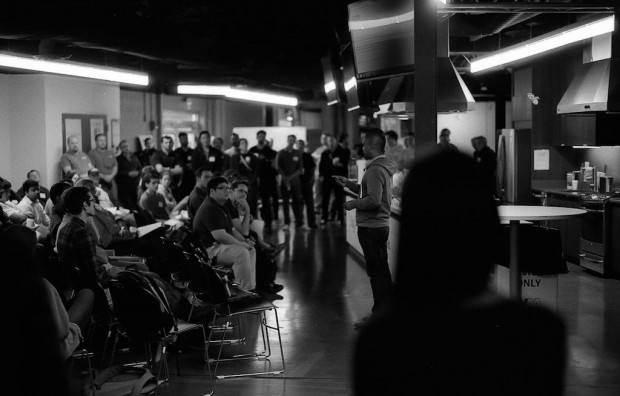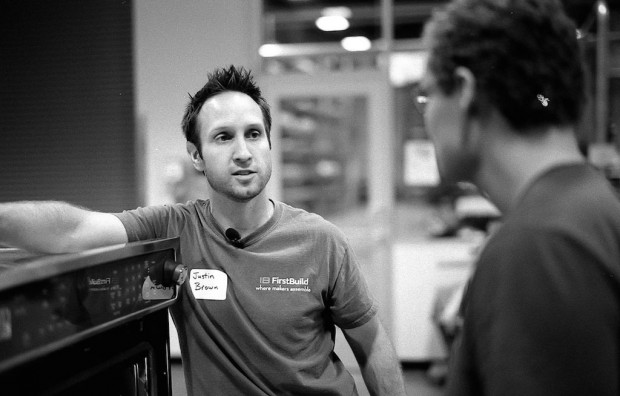FirstBuild, a Louisville-based co-creation resource for makers of all stripes, has just revealed the winners of its second Hackathon, which focused on the winning concept of its first “mega” hackathon. In the “Hack the Home” competition earlier in 2015, the House Roast emerged, which taps into the settings of a standard GE convection wall oven and modulates them, via an app interface and Arduino controls, for a successful coffee roasting profile. On October 2, FirstBuild hosted another hackathon with the goal of creating an accessory kit that builds upon the home-based convection roasting solution.
The winning product concept was called Cool Beans, which is a folding perforated tray that lays flat to hold roughly a half a pound of beans inside the oven, although more than one tray could conceivably fit inside a standard oven. The tray then folds closed for convenient removal, and attaches to a hand-cranked rotisserie-style apparatus that agitates the beans for quick cooling while rattling free the chaff, which gets collected into a reservoir below. This simple yet effective concept was elected the winner of the single-day challenge for the completeness of the design, its functionality and the straightforward manufacturing path it presented.
FirstBuild, a partnership between GE Appliances and the co-creator community Local Motors, endeavors to galvanize professional, student and hobbyist “maker” communities to come up with ways of overcoming engineering obstacles and pursue innovation. FirstBuild then manufactures their crowdsourced designs in “microfactories,” thereby streamlining and accelerating the process of bringing new concepts to market.
In this case, the objective was to offer would-be home roasters an alternative to costly domestic coffee roasting machines. The hackathon on October 2 fell on National Manufacturing Day, and hosted Stephanie Santos, the Senior Policy Advisor for Making at the White House Office of Science and Technology Policy. Louisville Mayor Greg Fischer was also in attendance. Maker teams in the hackathon were comprised of members ranging in age from 17 to 63, including high school students as well as longtime engineering professionals from a variety of industries.
Further development of the Cool Beans design will include a temperature sensor placed onto the rack for monitoring bean temp during the roasting process. That information will be fed back into an application that FirstBuild is developing, for storage and sharing between passionate home coffee roasters. The app will also serve to guide novices through the roasting process, as the goal is to make the process as simple and accessible as can be. “We’re looking to develop an accessory kit that will be very easy to use,” GE Appliances Senior Engineer and FirstBuild staff member Justin Brown told Daily Coffee News.
“It’s fairly well known that in a convection oven if you lay the beans flat on a perforated tray, you can achieve pretty good evenness depending on the oven design,” said Brown. “You’re basically using a high preheat and a convection setting to stir the air around the beans, but the beans remain flat in the oven.” Therefore since agitation during the roast is not crucial, the main goal of this hackathon was to come up with an item that makes it easy to cool the beans and remove and collect the chaff.
Yet while the Cool Beans concept won the day, that doesn’t mean it will be an actual product that GE elects to manufacture. That designation will come from the results of the longer-term three-week Home Oven Coffee Roaster design challenge that begins now and runs through October 25. “We’re hoping to collect a large sample of ideas and designs so that we can either choose one of those designs, or maybe there’s portions from one and portions from another that can combine into one product that we hope to launch before the end of the year,” said Brown.
Other concepts that have come up along the way have involved mechanisms for agitating the beans inside the oven during the roasting process, although those were more challenging to pull together under hackathon circumstances, given limited time and resources. A drum-rotating motor, for example, cannot be placed inside the oven due to the high temperatures, and the rules of the contest state that a design must not require any modification of the convection oven’s hardware or structure.
“There were a couple teams that looked at using coiled springs to kind of wind up the drum, so to speak, and then release that load in the oven,” said Brown. “However, for a one-day hackathon that’s a pretty lofty goal to achieve, since there’s some pretty substantial timing mechanisms that would need to be designed for that. I look forward to seeing more ideas like that, further fleshed out in the design challenge.”
Other elements of design that FirstBuild intends to address include smoke management. “That wasn’t part of the hackathon, but we are working on some designs with catalysts, in order to knock back the smoke that’s generated in the oven,” said Brown. “My initial results I’m pretty pleased with. I think we’ll be able to work that out.”
Input from coffee professionals was provided by roasters from Louisville’s Sunergos Coffee, who delivered tutorials on the coffee roasting process. Green beans were provided by Sweet Maria’s, with whom FirstBuild was particularly interested in partnering as they may provide an ideal retail outlet for the finished home coffee-roasting kit that comes from it all. Representatives from Sweet Maria’s will also assist in judging the competition. Realistically, FirstBuild said they hope to have a market-ready kit in consumers’ hands by early next year.
Howard Bryman
Howard Bryman is the associate editor of Daily Coffee News by Roast Magazine. He is based in Portland, Oregon.









Comment